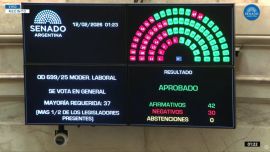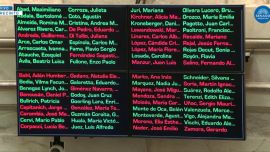Last Sunday’s general elections in Argentina have produced a fragmented Congress: the centre-left Peronists are now the first minority in both houses, the centre-right opposition (if it sticks together) is confirmed as the second force and the far right libertarians led by Javier Milei registered a major advance to become a strong third caucus, according to the official data.
The ruling Unión por la Patria (UxP) coalition, whose presidential candidate Economy Minister Sergio Massa won the first round of the presidential ballot with 36.6 percent, has lost 10 seats in the Chamber of Deputies but will be the lower house’s first minority with 108 of the 257 members (half of whom are renewed every two years).
If Massa wins next month’s run-off, Peronism will need more than a score of opposition deputies to ensure the minimum quorum of 129 deputies in order to open debate on legislative changes.
La Libertad Avanza (LLA), led by Milei whose 29.9 percent qualifies him to compete with Massa in the November 19 run-off, has had only three deputies since the 2021 midterms, including the candidate himself, but that is all set to change. The libertarian party won a further 35 seats last Sunday to total 38, securing representation in no less than 20 of the 24 electoral districts too.
The second force in the lower house should continue to be the centre-right coalition Juntos por el Cambio (JxC), whose candidate Patricia Bullrich failed to reach the run-off with 23.8 percent of the vote.
Their future caucus will number 93 deputies with 56 of their current 118 seats up for renewal this year and only 31 retained.
However, the bloc could split in the wake of Bullrich’s announcement she will back Milei in the run-off. Lawmakers from the Unión Cívica Radical (UCR) and Coalición Cívica-ARI could walk and form independent groupings.
A possible alliance of LLA and JxC deputies, as immediately proposed by Milei after the elections, would ensure them a slender lower house majority over the Peronists in purely numerical terms although the opposition coalition is highly complex.
Elsewhere, the 18 deputies not belonging to any of the three leading coalitions consists of seven dissident Peronists, six provincial party representatives and five leftists.
At the level of districts, the UxP list in Buenos Aires Province headed by Máximo Kirchner managed to hold 16 of the 19 seats won in the huge Frente de Todos victory of 2019 against most expectations.
JxC and LLA won nine each with leftist Cristian Castillo completing the 35 new deputies. Headed by Cristian Ritondo the JxC deputies-elect also include Mauricio Macri’s 2019 running-mate Miguel Ángel Pichetto.
Topped by the controversial Alberto Benegas Lynch Jr (who urged breaking relations with the Vatican), the list of elected libertarian deputies includes the also controversial influencer Lilia Lemoine and the journalist Marcela Pagano.
In this city the JxC list headed by the ballet dancer Maximiliano Guerra claimed half the 12 seats at stake while UxP took four and the LLA elected two libertarian deputies (the economist Diana Mondino and Oscar Zago).
Most of the 130 new deputies are not household names but they include outgoing Entre Ríos Peronist Governor Gustavo Bordet, current Transport Minister Diego Giuliano (Santa Fe), former Agriculture minister Luis Basterra (Formosa) and libertarian Martín Menem (La Rioja).
Senate breakdown
Meanwhile in the Senate, the Peronists have displaced JxC as the first majority by clinching 34 of the 72 seats with a net gain of two – but will need 37 senators for quorum.
Under Bullrich’s leadership, the opposition has suffered a disastrous election, dropping to 24 senators after losing nine seats. They were defending seats in all eight provinces renewing three senators each (Buenos Aires, Formosa, Jujuy, La Rioja, Misiones, San Juan, San Luis and Santa Cruz) except San Juan, but could only hang on to one seat each in Buenos Aires (UCR politician Maximiliano Abad) and Misiones.
The biggest casualty was Radical caucus chief Luis Naidenoff in Formosa (displaced by libertarian rancher Francisco Paoltoni) while another major disappointment was striking out completely in a Jujuy Province now entering its third consecutive term of Radical rule.
Almost all their losses were the gain of Milei’s LLA, which now makes its upper house début with eight senators, all of them new to politics. Three dissident Peronists and three provincial party representatives complete the 72 seats.
Quorum is thus not within the reach of any one coalition or even a combo of two, not even a JxC/LLA alliance.
The new senators include current Interior Minister Eduardo ‘Wado’ de Pedro and Unidad Ciudadana caucus chief Juliana Di Tullio (whose seat would have been jeopardised by a continuation of PASO primary trends) in Buenos Aires Province. José Mayans, who heads the other ruling coalition Senate caucus Frente Nacional y Popular, was also re-elected in Formosa.
Outgoing San Juan Peronist Governor Sergio Uñac will now become a senator for his province, which he nevertheless lost to the LLA who claimed the other two seats.
The Kirchnerite cradle of Santa Cruz was almost the only disappointment in a generally positive scenario for the Peronist cause. Outgoing Governor Alicia Kirchner now moves to the Senate like Uñac but failed to take YPF President Pablo González with her.
– TIMES/AFP/PERFIL

























Comments